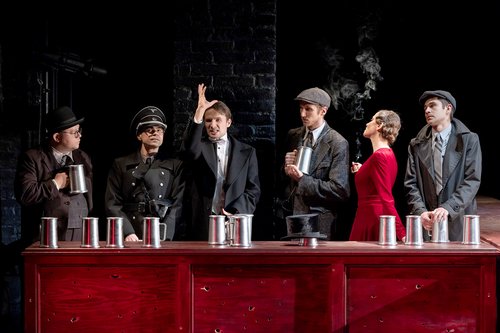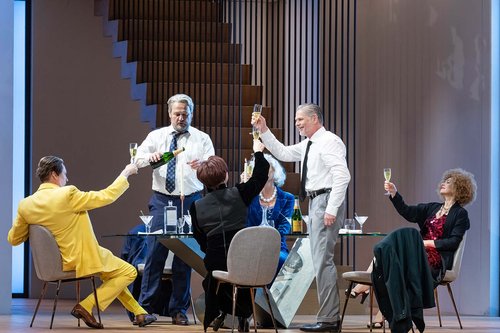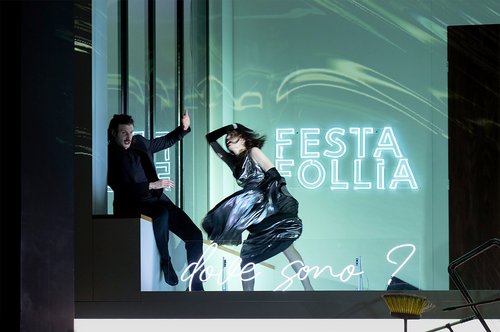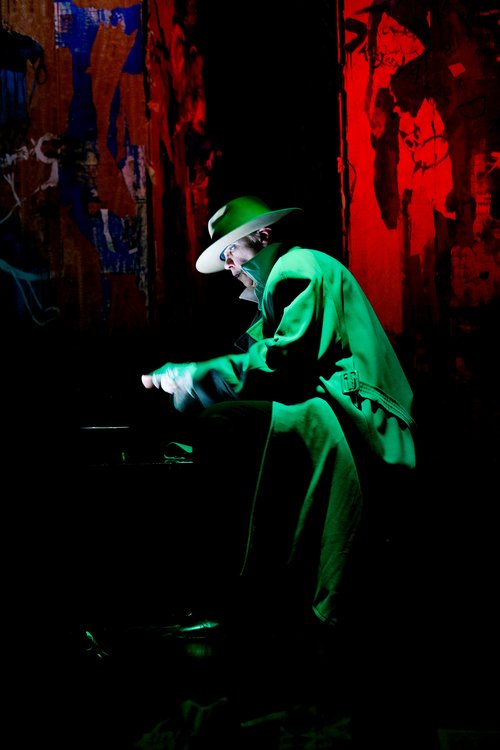Elizabeth Costello. Seven Lessons and Five Moral Tales. Krzysztof Warlikowski, 2024. Avignon Festival. Courtesy of Magda Hueckel
The Festival d’Avignon platforms some of the most cutting-edge contemporary theatre from around the world, and its 78th edition has concluded with Krzysztof Warlikowski’s ‘Elizabeth Costello. Seven Lessons and Five Moral Tales’, marking an impressive finale.
Founded in 1947 by Jean Vilar, a year after the opening of the Festival de Cannes, the Festival d’Avignon was seen at the time as a sign of post-war regeneration in France and was to be an inclusive theatrical platform for everyone. One year later in 1948, the Festival in Aix-en-Provence, dedicated to the musical theatre, was created and together with ‘Les Rencontres de la photographie’ in Arles, which have been in existence since 1970, these festivals form a powerful constellation of events in the South of France. Of course, nowadays they are not as inclusive as they once were and now the inhabitants of what were once the medieval cities of Arles or Avignon exist on tourism, and even the Olympic Games in Paris are more affordable today than these large-scale cultural events.
Under the directorship of Tiago Rodrigues, what makes this edition of the festival unique is that there is no main theme, and instead the focus is on a specific language – in this case Spanish – with an attempt to find a balance between cinema, literature and contemporary art.
‘Elizabeth Costello. Seven Lessons and Five Moral Tales’, by the renowned artistic director of the Nowy Teatr in Warsaw, Krzysztof Warlikowski (b. 1962) closed the curtain on this year’s festival. With a strong protagonist at the centre of it, and essentially a reflection on death, instead of reconciling theatre and cinema, this production places the accent on theatre’s relationship with literature and contemporary art.
Warlikowsky’s own life is itself worthy of the stage. Speaking to Dmitry Renansky in an interview for Colta.ru in 2011 he said: “I am very lucky: I have always been an outsider. In Szczecin because of my homosexuality – can you imagine what it was like to be gay in a working-class communist city? – in Paris because I was a foreigner, in Krakow because of my European background. And yes, don't forget that I am Jewish. My otherness was and still is a source of inspiration.”
On the stage, where the main spaces are a bathroom, a bed with two chairs, and on a glass-house resembling an aquarium (used once before in Warlikowsky’s productcion of ‘(A)pollonia’, shown in Avignon in 2009) is projected a video ‘Anywhere Out of the World’ (2000) by French artist Philippe Parreno (b. 1960), the title of which references an eponymous poem by Charles Baudelaire. In the video, the character Ann Lee, created by a Japanese firm specializing in manga characters, tells her own story, presenting herself as an empty envelope for sale to be filled with any invented story. This introduction serves as a key for the story of Elizabeth Costello, that will be narrated over the next four hours. The director uses Parreno’s method when working on the character of his play’s protagonist Elizabeth Costello.
Elizabeth Costello, an imaginary writer at the centre of the play, who has already appeared in ‘The End’ and ‘(A)pollonia’ by Krzysztof Warlikowski, is not his own invention. The character was first depicted in several novels by South African and Australian writer John-Maxwell Coetzee (b. 1940). In these novels, Costello is shown as a person who is known for her controversial opinions. Yet Warlikowski chooses to present this character as a kind of a living work of art. As reference points he uses texts by French artist Sophie Calle (b. 1953): ‘North Pole’, ‘La Dernière Image’ and ‘Des histoires vraies’. In her own works Sophie Calle is usually the main protagonist and investigator, studying and documenting herself and the lives of others. The approach is also reminiscent of Cindy Sherman (b. 1954) or Dominique Gonzalez-Foerster (b. 1965), who literally project themselves into the bodies of other people. Warlikowski is not so much interested in the plot twists of Coetzee’s novels, but on interpreting their characters.
Everything that happens to the characters on stage is filmed, and then projected on the back wall, against the walls of Avigon’s Papal palace. This constant projection consumes the action and serves to distance Elizabeth Costello, we witness a progressive depersonalization and dehumanization culminating with a scene at the end of her life where after comparing contemporary slaughter of animals with the Holocaust, Costello proposes the construction of a glass slaughterhouse in the centre of Melbourne, suggesting it will turn everyone into vegetarians. Yet it is not animals, but Elizabeth Costello’s family members that sit in the glass aquarium, while she narrates the story that she herself has written. The progressive absurdity of Costello’s story, underlined by an ape which follows her around, suggests yet another possible point of reference, also from Nowy Teatr in Warsaw, ‘Phobia’ by Markus Öhrn (b. 1972) and Karol Radziszewski (b. 1980), where members of the ‘Fag Fighters’ movement deliver brutal lessons in Polish history.
Those looking for a happy ending do not find it, there is no consolation at the end of Warlikowski’s complete deconstruction of Elizabeth Costello, she does not regain sanity, the brilliant writer and thinker is gone. Like for Baudelaire, life for Warlikowski seems to be “a hospital where every patient is obsessed by his or her desire to change beds”, and the only place for strong characters is to be “out of this world”.














